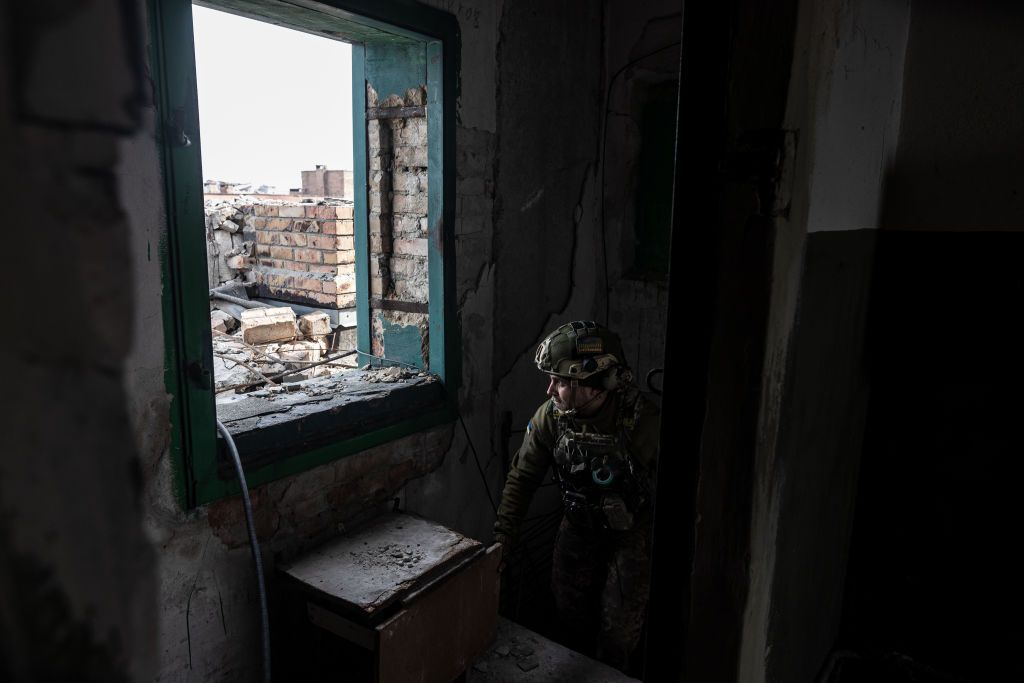Ukrainian State-Owned Enterprises Weekly – Issue 84

Editor’s Note: This is issue 84 of Ukrainian State-Owned Enterprises Weekly, covering events from April 15-21, 2023. The Kyiv Independent is reposting it with permission.
Ukrainian SOE Weekly is an independent weekly digest based on a compilation of the most important news related to state-owned enterprises (SOEs) and state-owned banks in Ukraine. This publication was produced with the financial support of the European Union within the project “Supporting Ukraine in rebuilding and recovery” implemented by the KSE Institute. The contents of this publication are the sole responsibility of the editorial team of the Ukrainian SOE Weekly and do not necessarily reflect the views of the European Union.
Corporate governance of SOEs
High Anti-Corruption Court extends the measure of restraint for Kobolyev for another two months. On April 17, the High Anti-Corruption Court (HACC) issued a two-month extension on a ruling that requires former Naftogaz CEO Andriy Kobolyev to:
- show up whenever summoned by a detective, prosecutor, investigating judge, or the court;
- remain in Kyiv Oblast unless given special permission by a detective or prosecutor assigned to this case;
- inform the detective and prosecutor of any change of residence;
- refrain from communicating with people specified in the court order;
- hand in all international passports and other travel documents;
- wear an electronic monitoring device.
According to the law firm Miller, which represents Kobolyev, the ex-CEO was given back his citizenship documents and allowed to move around Kyiv Oblast.
According to the Specialized Anti-Corruption Prosecutor’s Office (SAPO), Kobolyev’s lawyers filed a motion with the HACC asking the court to change the measure of restraint from bail of Hr 230 million ($6.3 million) and procedural obligations to a personal obligation (suggesting neither bail nor an electronic monitoring device.)
Only part of the bail has been posted for Kobolyev, although the court ruling on this matter dated back to March 1, SAPO added. SAPO said that its prosecutor did not agree with a more lenient measure of restraint for Kobolyev, and he/she would insist on this in court.
Later, SAPO reported that the HACC dismissed the defense’s motion.
In SOE Weekly (Issue 83), we reported that the HACC dismissed the motion of the National Anti-Corruption Bureau of Ukraine (NABU) detective to extend the pre-trial investigation against Kobolyev.
Shortly after the ruling to dismiss the NABU’s request, SAPO said that the pre-trial investigation was completed, and its materials were available to the suspect (Kobolyev)and his defence (see Issue 83).
As we reported earlier, on Jan. 19, NABU and SAPO notified Kobolyev that he was suspected of misappropriating (illegally awarding himself) over Hr 229 million ($6.2 million) in 2018, which was part of the bonuses granted to Naftogaz’s team in May 2018 for the company’s historic victory against Russia’s Gazprom in Stockholm’s court of arbitration.
For an extended background of the Kobolyev case, see SOE Weekly’s Issues 71, 72, 73, 77, 78, 79, and 83.
For an analysis of this case from a corporate governance perspective, see a series of columns by SOE Weekly team members Andriy Boytsun, Oleksandr Lysenko, and Dmytro Yablonovskyy: Are Kobolyev's bonuses a threat to corporate governance reform? Part 1, Part 2, and Part 3.
Cabinet appoints a new member to Ukrzaliznytsia’s executive board. On April 18, the Cabinet of Ministers appointed Anton Mishyn as a new member of Ukrzaliznytsia’s executive board for six months.
According to Ukrzaliznytsia’s charter, the Cabinet appoints the CEO and executive board members on proposal of the company’s supervisory board. That is, in the case of Ukrzaliznytsia, the Cabinet has the final say, not only on the CEO, but also all other executive board members.
Mishyn has been the chief financial officer (CFO) of Ukrzaliznytsia since August 2022.
From July 2019 to April 2022, he was the executive director and director of finance and risks at DTEK Renewables. From 2016 to 2019, Mishyn worked as the CFO at DTEK Energy.
In 2015-2016, he worked as the CFO and a management board member at Ukrtransnafta. From 2014 to 2015, he was the director of the Economy and Planning Department at Naftogaz.
From 2008 to 2013, Mishyn worked as the finance director at Yenakiieve Steel Group (part of Metinvest group).
According to Ukrzaliznytsia’s CEO Yevhen Lyashchenko, the company’s goal is to break even, so Mishyn’s task is to optimize financial processes and continue to reduce costs.
As we reported in SOE Weekly’s Issue 72, Ukrzaliznytsia suffered Hr 11 billion ($300 million) in losses in 2022 and is expected to lose twice as much – Hr 20.2 billion ($552 million) – in 2023.
Another priority for Mishyn is to strengthen and develop relations with international financial partners, whose support is now critical for the development of Ukrzaliznytsia, Lyashchenko added.
In SOE Weekly (Issue 80), we reported that on March 21, the Cabinet of Ministers dismissed Kamyshin as Ukrzaliznytsia’s CEO, and appointed Yevhen Lyashchenko as the new CEO for the next two years. Previously, Lyashchenko served as Ukrzaliznytsia’s executive board member.
Privatization
Second attempt to privatize the Bilhorod-Dnistrovskyi trade seaport fails, the third auction is pending. On April 14, the State Property Fund of Ukraine (SPFU) announced that it would put the Bilhorod-Dnistrovskyi trade seaport up for privatization for the third time.
According to the SPFU, the previous auction did not result in a sale as the auction winner failed to pay for the property.
In SOE Weekly (Issue 74), we reported that the SPFU scheduled a privatization auction for the Bilhorod-Dnistrovskyi trade seaport on March 3.
In Issue 78, we reported that the auction failed because nobody registered, according to Oleksandr Slavskyi, head of the regional office of the SPFU in Odesa and Mykolaiv oblasts.
A new auction was scheduled for March 13. The starting price was halved – from Hr 187.6 million ($5 million) to Hr 93.8 million ($2.6 million).
According to Slavskyi, since Russia’s full-scale invasion, Bilhorod-Dnistrovskyi’s sea access has been blocked, and the port has thus been used for transshipment only.
In Issue 79, we reported that the second auction was more successful, with a winning bid of Hr 220 million ($6 million). However, the winner missed the 20 business-day window to pay for the property.
According to Prozzoro.Sale, the winner was Ukrdoninvest LLC, owned by Ukrainian businessman Vitaliy Kropachov. Kropachov is the owner of the Ukrdoninvest Group of companies with assets in the coal industry, machine-building, construction, transportation, and media.
In 2018, Kropachov’s Ukrdoninvest took part in the privatization auction for Centrenergo, but the SPFU later canceled the auction because the documentation submitted by the bidders did not meet the legal requirements.
At that time, the SPFU intended to sell the state-owned stake in Centrenergo (78.3%) at an auction with a starting price of Hr 5.9 billion ($161 million). Kropachov did not say what stake he already had in Centrenergo, revealing only that it was more than 1%.
In 2018, Ekonomichna Pravda (EP) wrote that Kropachov had monopolized the supply of coal to Centrenergo. According to EP, more than 80% of the coal supplied to Centrenergo was provided by entities directly or indirectly linked to the businessman.
Izmail winery privatized for Hr 200 million. On April 19, the SPFU sold the Izmail winery for Hr 200 million ($5.5 million), an 11-fold increase from the starting price of Hr 17.9 million ($489,000).
Four bidders competed for the property. According to Prozzoro.Sale, the winner is Fininvest Group P LLC. According to registers, it is owned by Roman Lobanov.
Notably, the lowest bid was equal to the starting price of Hr 17.9 million ($489,000). This bidder did not raise its bids during the auction. Another bidder offered Hr 30 million ($820,000) as its final bid.
A third bidder offered as much as the winning bidder, Hr 200 million ($5.5 million). As a result, Fininvest Group P won the auction because it was the first to offer Hr 200 million.
As with all privatization auctions, the winner has 20 business days to pay the lot price for the purchase agreement to be signed. If the winner fails to pay up, they forfeit their deposit, equal to 20% of the starting price.
The winery’s assets include a wine storage facility, a grape processing shop, bottling shops, a sparkling wine production shop, a finished goods warehouse, an exhibition venue, administrative buildings, etc. The total area of the premises is 27,200 sq. m.
The assets are located in Izmail, as well as in Suvorovo, Plavni, and Prymorske, all in Odesa Oblast.
Note that the SPFU had initially announced a privatization auction for the Izmail winery for April 11 with a starting price of Hr 35.7 million ($976,000). According to Prozzoro.Sale, this auction did not take place (probably, due to the lack of bids from potential buyers).
A new auction was scheduled for April 19. The starting price had been halved – from Hr 35.7 million to Hr 17.9 million.
It is remarkable that the winery’s starting price at the first auction, on April 11, did not attract the two bidders that ultimately offered a sixfold of that price at the second auction on April 19, that is, in just a week after the first auction.
Confiscation of the aggressor state’s assets, nationalization, and asset seizure
Shares in Ukrnaftoburinnya, one of Ukraine’s largest gas producers, transferred to ARMA. According to Censor.net, the Asset Recovery and Management Agency (ARMA) received all shares of Ukrnaftoburinnya after the asset was seized on April 7.
According to the registry, Ukrnaftoburinnya is owned by Ares Systems Ltd (22.49%), Deripon Commercial Ltd (22.49%), JKX Ukraine B.V. (10%), and Ariana Business Limited (22.49%). According to the media, the company is associated with businessmen Ihor Kolomoisky, Pavlo Fuks, and Vitaliy Khomutynnik.
Ukrnaftoburinnya is one of the largest private gas producers in Ukraine, producing 725.4 million cubic meters in 2021. According to Ekonomichna Pravda (EP), its 2021 net profit was Hr 5.65 billion ($154 million). In 2022, this fell to Hr 3.77 billion ($103,000).
The shares were seized in connection with a criminal investigation into the development of Ukraine’s largest explored gas field, the Sakhalin, in Kharkiv Oblast.
According to EP, the accusations stated in the criminal proceedings relate to allegedly illegal actions of officials of Nadra Ukrainy, the State Service of Geology and Subsoil of Ukraine, and a number of businesses during 2003-2022, which caused the state to lose the right to develop the Sakhalin field – this right eventually went to private companies, with Ukrnaftoburinnya being one of them.
The EP also reported that the gas field’s proven reserves were 15 billion cubic meters of gas, 1.7 million tonnes of condensate, and about the same amount of oil.
Ukrnaftoburinnya stated that its shareholders and management learned about the court ruling to seize the company’s corporate rights from public sources on April 17. None of the company’s representatives received any official notification of the decision to seize corporate rights and transfer them to external management, Ukrnaftoburinnya added.
According to its statement, shareholders and managers do not understand the grounds for the decision or why it was reached without the company’s input. The management considers these actions to be unlawful and regards them as an attempt to seize the assets of a private business, Ukrnaftoburinnya said. The company has already filed an appeal.
Andriy Pasishnyk, CEO of JKX Oil & Gas, a company listed on the London Stock Exchange, said on his Facebook page that JKX considers suing Ukraine over the seizure of its corporate rights in Ukrnaftoburinnya in both Ukrainian and international courts. Pasishnyk said that JKX acquired a 10% stake in Ukrnaftoburinnya in 2006.
JKX will also inform the British Embassy in Ukraine and the American Chamber of Commerce and Industry, of which JKX is a member, “about the violated rights and illegal expropriation of the group’s assets in Ukraine,” Pasishnyk wrote.
Notably, the English part of Pasishnyk’s Facebook post is considerably different from its Ukrainian version.
According to EP, there is a “99% probability” that these assets will ultimately be given to Naftogaz or one of its subsidiaries.













